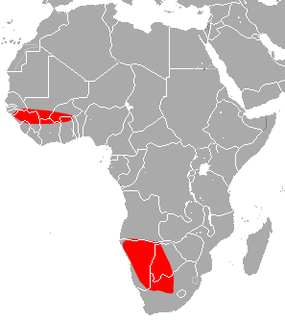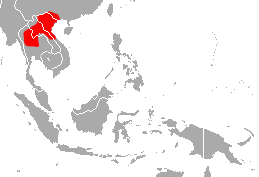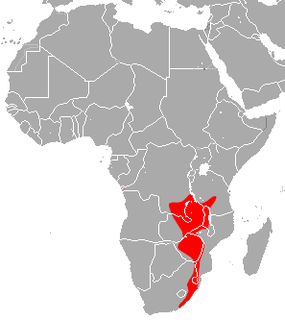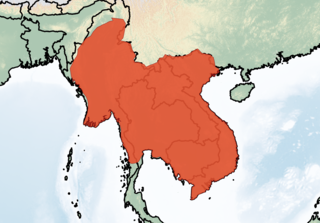
Horseshoe bats are bats in the family Rhinolophidae. In addition to the single living genus, Rhinolophus, which has about 106 species, the extinct genus Palaeonycteris has been recognized. Horseshoe bats are closely related to the Old World leaf-nosed bats, family Hipposideridae, which have sometimes been included in Rhinolophidae. The horseshoe bats are divided into six subgenera and many species groups. The most recent common ancestor of all horseshoe bats lived 34–40 million years ago, though it is unclear where the geographic roots of the family are, and attempts to determine its biogeography have been indecisive. Their taxonomy is complex, as genetic evidence shows the likely existence of many cryptic species, as well as species recognized as distinct that may have little genetic divergence from previously recognized taxa. They are found in the Old World, mostly in tropical or subtropical areas, including Africa, Asia, Europe, and Oceania.

The Pomona roundleaf bat, Pomona leaf-nosed bat, or Andersen's leaf-nosed bat is a species of bat in the family Hipposideridae that is endemic to India.

The intermediate horseshoe bat is a bat species of the family Rhinolophidae that is very widespread throughout much of the Indian subcontinent, southern and central China and Southeast Asia. It is listed by IUCN as Least Concern as it is considered common where it occurs, without any known major threats.

The halcyon horseshoe bat is a species of bat in the family Rhinolophidae. It is found in Cameroon, Republic of the Congo, Democratic Republic of the Congo, Ivory Coast, Equatorial Guinea, Ghana, Guinea, Kenya, Liberia, Nigeria, Senegal, South Sudan, Togo, Uganda, possibly Gabon, and possibly Sierra Leone. Its natural habitats are subtropical and tropical dry and moist lowland forest, moist savanna, caves, and other subterranean habitats.

The lesser woolly horseshoe bat, also called Beddome's horseshoe bat, is a species of bat in the family Rhinolophidae. It is found in India and Sri Lanka. Its natural habitats are subtropical or tropical moist lowland forests, caves, and urban areas.

The Andaman horseshoe bat is a species of bat in the family Rhinolophidae. It is endemic to the Andaman Islands. During the day, it roosts in caves, but may also choose tree hollows.

The convex horseshoe bat is a species of bat in the family Rhinolophidae. It is found in Malaysia and Laos.

Dent's horseshoe bat is a species of bat in the family Rhinolophidae. It is found in Angola, Botswana, Ghana, Guinea, Guinea-Bissau, Namibia, South Africa, and Zimbabwe. The bat's natural habitats are dry savannah country and it roosts in caves and other subterranean habitats.

Blyth's horseshoe bat is a species of bat in the family Rhinolophidae. It is found across southern Asia from Afghanistan to Vietnam. The species can be identified from its pointed, bifid sella.

Maclaud's horseshoe bat is a species of bat in the family Rhinolophidae. It is endemic to Guinea. Its natural habitats are moist savanna, caves and other subterranean habitats. It is one of five African microbat species to be listed as endangered by the IUCN. In 2013, Bat Conservation International listed this species as one of the 35 species of its worldwide priority list of conservation. It is threatened by habitat loss.

The big-eared horseshoe bat is a bat species within the Rhinolophidae native to Asia.

Bourret's horseshoe bat is a species of horseshoe bat native to Southeast Asia. The name "paradoxolophus" is derived from the Greek words paradoxos, meaning "contrary to expectation", and lophos, meaning "crest". This name refers to the bat's difference in nose-leaf morphology compared to other Rhinolophus species. There are no recognised subspecies.

Pearson's horseshoe bat is a species of bat in the family Rhinolophidae. It is found in Bangladesh, Bhutan, China, India, Laos, Malaysia, Myanmar, Nepal, Thailand and Vietnam.

The least horseshoe bat is a species of bat in the family Rhinolophidae. It is found in Cambodia, China, India, Indonesia, Laos, Malaysia, Myanmar, Nepal, Thailand and Vietnam. It is a food source of the parasite Sinospelaeobdella, a jawed land leech.

The Chinese rufous horseshoe bat is a species of bat in the family Rhinolophidae. It is found in Bhutan, China, India, Nepal, and Vietnam.

Swinny's horseshoe bat is a species of bat in the family Rhinolophidae. In English, R. swinnyi is commonly referred to as Swinny's horseshoe bat. In Afrikaans, it is commonly referred to as Swinny se saalneusvlermuis. This species belongs to the African clade. R. swinnyi was discovered by an African collector H. H. Swinny. They have been recorded in Angola, Republic of the Congo, Mozambique, South Africa, Tanzania, Zambia, Zimbabwe, and Malawi.
The Bornean woolly horseshoe bat or Proconsul's horseshoe bat is an endangered species of horseshoe bat found in Malaysia. Though it was discovered in 1959, it was not recognized as a distinct species until 2013.
Rhinolophus xinanzhongguoensis, the wedge-sellaed horseshoe bat or southwestern China horseshoe bat, is a species of horseshoe bat from China.

Rhinolophus microglobosus is a species of horseshoe bat found in Southeast Asia.

















